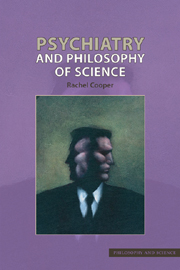Book contents
- Frontmatter
- Contents
- Acknowledgements
- 1 Introduction: psychiatry and philosophy of science
- 2 The nature of mental illness 1: is mental illness a myth?
- 3 The nature of mental illness 2: if mental disorders exist, what are they?
- 4 Explanations in psychiatry 1: natural-history based explanations
- 5 Explanations in psychiatry 2: individual case histories
- 6 Relations between theories 1: when paradigms meet
- 7 Relations between theories 2: reductionisms
- 8 Managing values and interests 1: psychiatry as a value-laden science
- 9 Managing values and interests 2: big business and judging treatments
- 10 Conclusion
- Notes
- Further reading
- Bibliography
- Index
1 - Introduction: psychiatry and philosophy of science
- Frontmatter
- Contents
- Acknowledgements
- 1 Introduction: psychiatry and philosophy of science
- 2 The nature of mental illness 1: is mental illness a myth?
- 3 The nature of mental illness 2: if mental disorders exist, what are they?
- 4 Explanations in psychiatry 1: natural-history based explanations
- 5 Explanations in psychiatry 2: individual case histories
- 6 Relations between theories 1: when paradigms meet
- 7 Relations between theories 2: reductionisms
- 8 Managing values and interests 1: psychiatry as a value-laden science
- 9 Managing values and interests 2: big business and judging treatments
- 10 Conclusion
- Notes
- Further reading
- Bibliography
- Index
Summary
This book is about psychiatry and the philosophy of science. It aims to be of interest to philosophers of science and their students, to mental health professionals and also to a broader “lay” audience. I have two main objectives. For readers interested primarily in psychiatry I shall show that psychiatry is similar enough to other sciences for ideas from the philosophy of science to be helpful in solving conceptual problems within psychiatry. For readers interested primarily in the philosophy of science I shall show that psychiatry is dif erent enough from other sciences for an investigation of psychiatry to enable old problems in the philosophy of science to be viewed from a new and fruitful angle.
Some readers of this book will be unfamiliar with key concepts in psychiatry. Others will be new to the philosophy of science. The first part of this introduction explains terms and concepts that may be novel. The second part of this chapter considers whether psychiatry can rightly be considered a science. The final section sketches the topics that will be considered in the remainder of the book.
An introduction to terms and concepts
Here I explain terms and concepts that may be unfamiliar. Some of this introduction will be frustratingly basic to readers who are already familiar with the subject matter, and they will not miss anything important if they skip the introductory sections.
- Type
- Chapter
- Information
- Psychiatry and Philosophy of Science , pp. 1 - 10Publisher: Acumen PublishingPrint publication year: 2007



